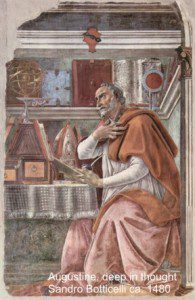 The next chapter of Ron Highfield’s new book The Faithful Creator looks explicitly at divine creation and modern science. Certainly the first image that comes to mind for many is the (supposed) conflict between the conclusions of modern science and biblical faith in God as creator. But is this conflict real and unavoidable, or is it a conflict grounded in misunderstanding? Highfield suggests that “we need clear distinctions between theological, metaphysical, and scientific domains and methods of study.” He believes “much confusion has been created by confusing these domains and methods.” (p. 144)
The next chapter of Ron Highfield’s new book The Faithful Creator looks explicitly at divine creation and modern science. Certainly the first image that comes to mind for many is the (supposed) conflict between the conclusions of modern science and biblical faith in God as creator. But is this conflict real and unavoidable, or is it a conflict grounded in misunderstanding? Highfield suggests that “we need clear distinctions between theological, metaphysical, and scientific domains and methods of study.” He believes “much confusion has been created by confusing these domains and methods.” (p. 144)
I don’t want to dig deeply into the philosophy of science and the nature of the knowledge that the practice of science brings to light. Highfield points out that “most working scientists are not philosophically reflective,” with which I agree completely. But most philosophers of science also don’t seem to have a real appreciation for the practice of science. This isn’t surprising. As someone who has been a practicing scientist for 35 years and a professor for 24 years I find that my understanding of both the science and the nature of scientific practice continues to grow. Outsiders can and often do bring important insights – but will still miss aspects of the practice. (I will note that Highfield’s comments on the all too human nature of the scientific community ring true as well. Scientists are subject to all of the usual shortcomings and weakness that come with being fallen human beings. Nor are theologians or any other groups exempt from these.)
Scientific Knowledge. Highfield’s primary point about the nature of scientific knowledge is that it is empirical and relates to the interconnections between empirical observations. This alone sets a limit to scientific knowledge and a limit to the applicability of science to the Christian doctrine of creation.
Modern natural science is not the science of everything or of every dimension of the world. Science cannot adjudicate the question of whether there is more to the world than the empirical. It is blind to all else. If there is something more, other methods of study will be required to investigate it. … The Christian doctrine of creation does not derive from empirical experience of the world or the study of relationships between sets of empirical phenomena within the world. In theology, the God-relation is everything. Innerworldly empirical relations are of no concern. (p. 151)
The theological theses or affirmations of creation are consistent with any scientific perspective because they say nothing in particular about the empirical relationships that science uncovers. (See A Theology of Creation and In The Beginning for more discussion of these.)
- The one God is the absolute origin and sovereign ruler over all that is not God.
- The one God freely established the Creator-creature relation.
- The creation really exists before God and stands before him as good.
- The Creator-creature relation established at the beginning, with its characteristic qualities, endures for all time.
- Human beings possess a unique relationship to the Creator characterized by their image and likeness to God and responsibility to him.
- God acts on and relates to the world from the Father, through the Son and in the Holy Spirit.
A Christian theology of creation is centered on the nature of God and his relationship with his creation. “These theses are consistent with any scientific law or cosmic history or history of life. Indeed, there is absolutely nothing that is discoverable by the empirical methods of natural science that could falsify or verify even one of these affirmations.” (p. 152)
This doesn’t mean that science and theology have no interaction, they should be in dialogue with each other. And there can be conflict at the metaphysical level, but this is conflict of a different sort. Science and theology are independent because “there are no theories or facts that do double duty in both theology and natural science.” (p. 155)
The science of origins, whether the origin of the universe (big bang), the origin of life (a big unknown) or the origin of species (evolution) doesn’t touch on any important aspects of our theology of Creation. The big bang can neither prove or disprove the theology of God as creator. The multiverse (if real) isn’t a threat to our theology of creation. God could have created any number of universes with any number of different characteristics. We have no a priori theological reason for thinking one way or another. Evolution isn’t a problem either. Biological science accounts for reproduction and variation, but that’s it. “At no point does biological science take into account my relationship to God, as a creature or as a person.” But there is an even bigger point:
The doctrine of creation does not merely affirm that the first creatures, whether they were atoms or Adams, were created by God. It affirms that all things throughout all time and space, including you and me, are just as much God’s creation as the first creatures were. Evolutionary biology accounts for changes over time the same way it accounts for our births, that is, through empirical data and empirically based scientific law. I reject the idea that my identity, my relationship to God or my purpose in life can be reduced to biological categories. And I reject the idea that an evolutionary account of the history of life can prove or disprove creation. God’s relationship to his creatures is not an empirical phenomenon and is not subject to investigation by empirical science. It transcends all physical laws; for all physical laws are aspects of the physical world and as such are created. (p. 159)
God’s as Creator isn’t limited to the origin of anything, whether the universe, life, species, or human beings. God is Creator from beginning to end and at all times between.
Highfield also objects to the notion that either the evolution or the big bang should be viewed as God’s means of creation. This limits God to physical processes, but God as creator of all is also the creator of those laws and processes. Thinking about Highfield’s argument, I would say that God doesn’t use the big bang to create, the big bang is his creation. He doesn’t use evolution to create, evolution is his creation. “The eternal God creates all laws and processes and the entire web of relations internal to creation.” (p. 159)
 Augustine. Highfield has argued that the theology of creation should be limited to God’s relationship to creation and creation’s relationship to God. This is independent of science, whether ancient, modern, or future. This approach is largely the approach taken by Augustine. Unfounded speculations concerning the cosmos had played a role in turning him from Manichaeism and he didn’t want Christians to fall into this trap.
Augustine. Highfield has argued that the theology of creation should be limited to God’s relationship to creation and creation’s relationship to God. This is independent of science, whether ancient, modern, or future. This approach is largely the approach taken by Augustine. Unfounded speculations concerning the cosmos had played a role in turning him from Manichaeism and he didn’t want Christians to fall into this trap.
Augustine applies this lesson to Christians: “When I hear this or that brother Christian, who is ignorant of these matters and thinks one thing is the case when another is correct, with patience I contemplate the man expressing his opinion.” As long as the man does not say something “unworthy” of God, Augustine is willing to let it go. “But it becomes an obstacle if he thinks his view of nature belongs to the very form of orthodox doctrine, and dares obstinately to affirm something he doesn’t understand.” Clearly Augustine did not want Christianity brought into disrepute because of the doubtful interpretations on matters irrelevant to faith. (p. 169)
The quotes are from The Confessions (v.9). Augustine expresses the same caution in his commentaries on Genesis including The Literal Meaning of Genesis. In many cases the meaning and intent isn’t certain and we should be careful not to bring disrepute to the gospel message, that is “the resurrection of the dead, the hope of eternal life, and the kingdom of heaven,” over issues that have no lasting significance. The Galileo episode provides an example here. If Cardinal Bellarmine had taken Augustine’s advice and avoided pronouncements on the heretical nature of a sun-centered cosmology, the mission of the church would have been better served. We do well to take Augustine’s advice today as well. A focus on God’s relationship to creation and creation’s relationship to God helps to avoid unnecessary trouble.
There is more in this chapter, including and interesting discussion of Intelligent Design and its relationship to a theology of Creation, but this will wait for the next post.
Is a Christian theology of creation concerned with material processes?
What is the relationship between creation and science?
If you wish to contact me directly you may do so at rjs4mail[at]att.net.
If interested you can subscribe to a full text feed of my posts at Musings on Science and Theology.











